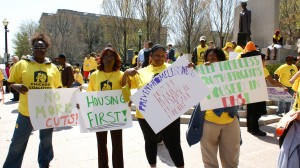
Chicago Coalition for the Homeless does not accept government funding. Instead, when CCH advocates for public support, it is for the programs that shelter, house and assist homeless youth, students, families, and vulnerable adults.
During this successful legislative session, CCH policy and organizing staff, alongside our grassroots leaders, worked on various initiatives to remove barriers for people experiencing homelessness.
Shared advocacy and organizing in Springfield resulted in increased funding for housing programs in the FY23 state budget as well as the passage of HB 5265, HB 4242, and HB 2775, bills that will support K-12 students, increase access to child care, and ban source of income discrimination for renters.
HB 5265: Financial Equity in Education for Students (FEES)
Working to ensure students who experience poverty aren’t burdened, CCH successfully advocated for the passage of House Bill 5265, Facilitating Equity in Education for Students, sponsored by Representative Will Guzzardi and Senator Ann Gillespie. This legislation provides access to fines and fee waivers for students who are eligible for free lunch in both public and charter schools. It also ensures that students’ transcripts and diplomas cannot be withheld because of outstanding fees.
“Providing waivers prevents students from falling through the cracks and helps students stay focused on their academics and not their current situation. It is important for students to feel that they matter and that they’re not forgotten during difficult times,” CCH Grassroots Leader April Harris shared.
HB 4242: Extend automatic eligibility to the Child Care Assistance Program (CCAP) for families involved in the child welfare system
CCH worked in collaboration with Start Early to provide access to the Child Care Assistance Program (CCAP) and Early Intervention (EI) for youth parenting in care through the passage of House Bill 4242, sponsored by Representative Lakesia Collins and Senator Julie Morrison. This legislation makes parenting youth in care automatically eligible for CCAP, regardless of income, employment, or education/training status, and provides an additional eligibility period after their case with the Illinois Department of Children & Family Services (DCFS) closes.
Providing access to comprehensive, high-quality early care and education services represents a critical opportunity in supporting the children as well as their young parents to emancipate successfully.
Though there are 371 youths who are parenting while in care currently, only 19 are receiving child care assistance. This legislation expands eligibility to each of these families.
HB 2775: Expanding Housing Protections for All Illinoisans
The Illinois Coalition for Fair Housing, of which CCH is a member, passed legislation to prevent housing providers from discriminating against a prospective applicant’s source of income. House Bill 2775, sponsored by Representative LaShawn Ford and Senator Ram Villivalam, adds “source of income” to the Illinois Human Rights Act’s protections against discrimination in real estate transactions, making it a civil rights violation to refuse to consider an individual for housing solely based on their source of income.
Over half of Illinois households have been susceptible to source of income discrimination because they earn non-wage income, such as social security, retirement income, and public assistance. In addition, about 99,000 households who use Housing Choice Vouchers to pay their rent often experience source of income discrimination.
Increased funding for homelessness and housing programs in the FY23 budget
As Illinois works to recover from COVID-19, CCH successfully advocated for additional dollars to protect people who are or in danger of experiencing homelessness to secure housing and services.
The Homeless Youth line item received an additional $1,000,000 in funding, bringing the line item to its highest amount ever, at $8,403,100, for FY23.
The Homelessness Prevention line item also increased funding to $26 million from last year’s allocation of $10 million.
Lastly, additional funding will be made available through the American Rescue Plan Act (ARPA) funds. The General Assembly allocated $150 million to provide additional funds to supportive housing, re-entry housing, and other housing-related programs.
Advocacy continues to pass HB 4432: Creating Opportunity for Illinoisans in Need II (COIN II ACT)
CCH advocated with Heartland Alliance to increase the cash grant for Temporary Assistance for Needy Families (TANF) families, House Bill 4423. It was sponsored by Leader Marcus Evans, Jr. in the House and Senator Adriane Johnson in the Senate.
TANF is a cash grant providing families living in extreme poverty with assistance to meet their basic needs. Families are only permitted to use the program for 60 months in total and meet strict eligibility requirements. For instance, a family of three—a mom and her two children—must make less than $10,000 annually to qualify for this program. Parents are also required to work 20-30 hours per week and conduct other qualifying actions for the Department of Human Services.
HB 4432 would increase the TANF cash grant for families from 30% of the Federal Poverty Level (FPL) ($549/month for a family of three) to 50% ($915/month). This would be life-changing for families who are one crisis away from not being able to dig themselves out of poverty. It could mean servicing their vehicle, and getting their child into driver’s education so that they can drive them to cancer-related treatments.
HB 4423 would also ensure that when a noncustodial parent pays child support, that the money does exactly that, supports their child. Each year noncustodial parents are paying amounts collectively averaging between $30-50 million annually in child support that the state and the federal government keep, providing the families with only $2-3 million of those dollars collected, or pennies on the dollar.
On average for every dollar a noncustodial parent pays in child support, only 14 cents is provided to their child. The remainder goes to the state through the Illinois Department of Healthcare and Family Services within the Child Support Enforcement Division and the federal government, taking the bulk of the money. The federal “reforms” to public benefits in 1996 permit this taking. These families who are the poorest of the poor here in Illinois are mandated to turn over what little they receive in support to the state.
During the FY22 session, the COIN II Act passed through the House of Representatives unanimously, but stalled in the Senate.
CCH will continue to push for the passage of this important legislation to right an injustice that continues to be perpetuated.

For more information, contact Niya Kelly, Director of State Legislative Policy, Equity and Transformation.
